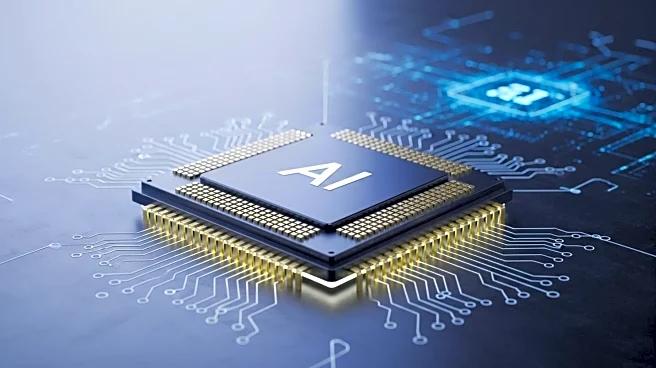What's Happening?
OpenAI has announced a partnership with Broadcom to design its own artificial intelligence computer chips. This collaboration aims to deploy customized AI accelerators by late next year, marking a significant step in OpenAI's strategy to enhance its computing infrastructure. The partnership follows recent deals with Nvidia and AMD, which provide specialized chips for OpenAI's AI systems. OpenAI's CEO, Sam Altman, highlighted the importance of this collaboration, noting that the computing power enabled by Broadcom will amount to 10 gigawatts, a substantial increase in infrastructure to support advanced intelligence. Broadcom's CEO, Hock Tan, emphasized the need for increased computing capacity as OpenAI progresses towards superintelligence. The announcement has led to a surge in Broadcom's shares, reflecting investor confidence in the potential of this partnership.
Why It's Important?
The collaboration between OpenAI and Broadcom is significant for the AI industry, as it represents a move towards greater control over the technological infrastructure required for AI development. By designing custom chips, OpenAI can tailor its hardware to better meet the demands of its AI systems, potentially leading to more efficient and powerful AI applications. This development could impact various sectors, including technology, business, and public policy, as AI continues to play a crucial role in innovation and economic growth. The partnership also highlights the growing trend of AI companies investing in their own hardware solutions to reduce dependency on external suppliers, which could lead to increased competition and advancements in AI technology.
What's Next?
OpenAI plans to deploy the new AI accelerators by late next year, which will likely enhance its computing capabilities and support the development of more advanced AI models. As OpenAI continues to expand its infrastructure, other AI companies may follow suit, leading to a shift in the industry towards custom hardware solutions. Stakeholders, including investors and technology developers, will be closely monitoring the progress of this partnership and its impact on the AI landscape. Additionally, the collaboration may prompt discussions on the ethical and regulatory implications of AI advancements, as increased computing power could accelerate the development of superintelligent systems.
Beyond the Headlines
The partnership between OpenAI and Broadcom raises questions about the sustainability and ethical considerations of AI development. As companies invest heavily in AI infrastructure, concerns about an AI bubble and the potential for overvaluation may arise. Furthermore, the pursuit of superintelligence brings ethical challenges, including the need for responsible AI governance and the potential impact on employment and societal structures. These considerations will be crucial as the industry navigates the complexities of AI advancement.










